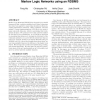Free Online Productivity Tools
i2Speak
i2Symbol
i2OCR
iTex2Img
iWeb2Print
iWeb2Shot
i2Type
iPdf2Split
iPdf2Merge
i2Bopomofo
i2Arabic
i2Style
i2Image
i2PDF
iLatex2Rtf
Sci2ools
144
click to vote
CORR
2011
Springer
2011
Springer
Tuffy: Scaling up Statistical Inference in Markov Logic Networks using an RDBMS
Markov Logic Networks (MLNs) have emerged as a powerful framework that combines statistical and logical reasoning; they have been applied to many data intensive problems including information extraction, entity resolution, and text mining. Current implementations of MLNs do not scale to large real-world data sets, which is preventing their widespread adoption. We present Tuffy that achieves scalability via three novel contributions: (1) a bottom-up approach to grounding that allows us to leverage the full power of the relational optimizer, (2) a novel hybrid architecture that allows us to perform AI-style local search efficiently using an RDBMS, and (3) a theoretical insight that shows when one can (exponentially) improve the efficiency of stochastic local search. We leverage (3) to build novel partitioning, loading, and parallel algorithms. We show that our approach outperforms state-of-the-art implementations in both quality and speed on several publicly available datasets.
| Added | 13 May 2011 |
| Updated | 13 May 2011 |
| Type | Journal |
| Year | 2011 |
| Where | CORR |
| Authors | Feng Niu, Christopher Ré, AnHai Doan, Jude W. Shavlik |
Comments (0)

